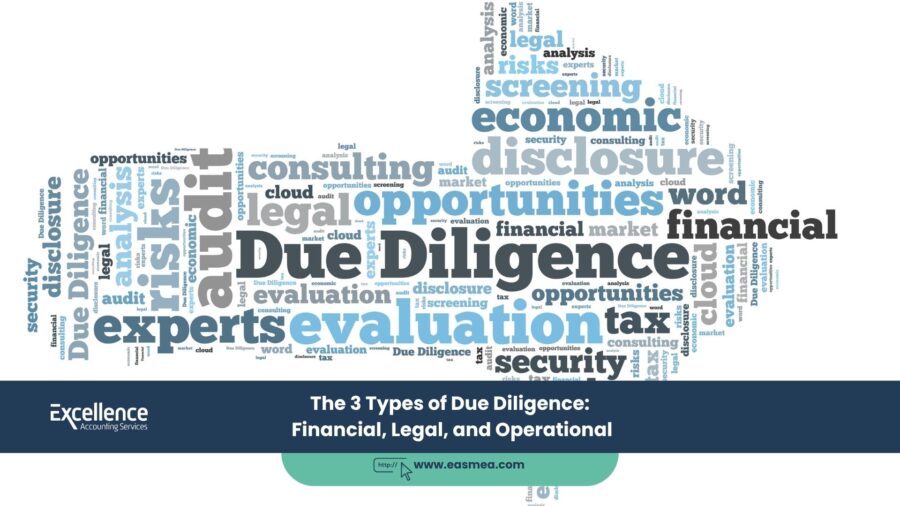The 3 Types of Due Diligence: Financial, Legal, and Operational
In the world of corporate finance and investment, “due diligence” is a term that carries immense weight. It represents the prudent, investigative process that precedes any significant business transaction, be it a merger, acquisition, or a substantial investment. For investors and business leaders in the dynamic UAE market, a thorough due diligence process is the ultimate safeguard against unseen risks and the foundation upon which successful deals are built. It is the methodical process of verifying information, assessing value, and uncovering potential liabilities before you commit your capital.
- The 3 Types of Due Diligence: Financial, Legal, and Operational
- Pillar 1: Financial Due Diligence – Verifying the Numbers
- Pillar 2: Legal Due Diligence – Assessing the Risks
- Pillar 3: Operational Due Diligence – Understanding the Business
- A Holistic Approach to Due Diligence with Excellence Accounting Services (EAS)
- Frequently Asked Questions (FAQs)
- See the Full Picture Before You Invest.
While the concept of due diligence is singular, its execution is multi-faceted. A comprehensive investigation is not a single, monolithic task but a coordinated effort across several key domains. To truly understand a target company, one must examine it through different lenses, each providing a unique and critical perspective. The three most fundamental pillars of this process are Financial, Legal, and Operational Due Diligence. Together, they form a powerful framework for making informed, intelligent, and secure investment decisions.
This guide will provide a deep dive into each of these three core types of due diligence. We will explore the specific questions each discipline seeks to answer, the key areas of investigation, and how they interlink to create a holistic, 360-degree view of a potential investment, with a special focus on the nuances of the UAE business landscape.
Key Takeaways
- Due Diligence is a Multi-Disciplinary Investigation: A complete review requires expertise in finance, law, and business operations.
- Financial Due Diligence Tests Profitability: It goes beyond audited statements to verify the true, sustainable earnings and cash flow of a business, forming the basis of its valuation.
- Legal Due Diligence Uncovers Hidden Liabilities: It examines corporate structure, contracts, and compliance to ensure there are no legal skeletons in the closet that could create future problems.
- Operational Due Diligence Assesses Practical Viability: It looks at the “how” of the business—its processes, systems, and market position—to determine if it can deliver on its promises.
- These Three Pillars are Interconnected: A finding in one area (e.g., a legal issue) will almost always have a financial and operational impact. A holistic approach is essential.
Pillar 1: Financial Due Diligence – Verifying the Numbers
Financial due diligence is the quantitative core of the entire process. Its objective is to move beyond the surface of the financial statements and understand the real economic engine of the business. It seeks to answer the fundamental question: “Are the financial claims of this business accurate, sustainable, and of high quality?”
Key Areas of Investigation:
- Quality of Earnings (QoE) Analysis: This is the most critical component. A QoE analysis adjusts a company’s reported earnings (EBITDA) to strip out any non-recurring, non-core, or one-off items. The goal is to arrive at a “normalized” earnings figure that represents the company’s true, ongoing profitability. For example, it would remove the profit from a one-time sale of property to show the core business performance.
- Working Capital Analysis: This involves a deep dive into the company’s short-term assets and liabilities. It analyzes trends in accounts receivable (how quickly customers pay), accounts payable (how quickly the company pays suppliers), and inventory levels. This helps identify any cash flow pressures or manipulation of profits.
- Debt and Debt-Like Items: The team identifies all forms of debt, including off-balance-sheet liabilities, loan covenants, and any items that will require a cash outlay post-transaction (e.g., pending employee bonuses).
- Forecast and Projections Review: Scrutinizing the management’s financial forecasts to assess whether the underlying assumptions are reasonable, well-supported, and achievable.
- Tax Compliance: A crucial part of financial due diligence in the UAE is verifying the company’s compliance with VAT and its readiness for Corporate Tax. Any past non-compliance represents a direct liability for the buyer.
Financial due diligence is the process of translating a company’s accounting story into an economic reality. It ensures the price you pay is based on fact, not fiction.
Pillar 2: Legal Due Diligence – Assessing the Risks
If financial due diligence is about verifying value, legal due diligence is about identifying risk. Conducted by legal professionals, this review examines a company’s legal structure, obligations, and compliance history to uncover any potential liabilities that could lead to future litigation, fines, or operational disruption. It answers the question: “What are the hidden legal and regulatory risks associated with this business?”
Key Areas of Investigation:
- Corporate Structure and Records: Verifying that the company is legally incorporated, its shares are properly issued, and its corporate minute books and records are complete and in order. In the UAE, this includes checking the validity of the trade license and ensuring compliance with the rules of the relevant economic department or free zone authority.
- Material Contracts Review: Analyzing key contracts with major customers, suppliers, landlords, and employees. The goal is to identify any unfavorable terms, change-of-control clauses, or non-compliance issues.
- Litigation History and Search: A thorough search for any pending, threatened, or past lawsuits involving the company.
- Licenses, Permits, and Regulatory Compliance: Ensuring the company holds all necessary permits to operate its business legally. This is especially critical in regulated industries.
- Intellectual Property (IP): Verifying the ownership and protection of key trademarks, patents, and copyrights.
- Employment and HR Compliance: Reviewing employment contracts and HR policies to ensure compliance with UAE Labour Law, including aspects like payroll and end-of-service benefits.
Pillar 3: Operational Due Diligence – Understanding the Business
Operational due diligence bridges the gap between the numbers (financial) and the rules (legal). It focuses on the practical, day-to-day reality of the business. It assesses the company’s internal processes, systems, people, and its position in the market to determine its efficiency, scalability, and overall health. It answers the question: “How does this business actually work, and can it continue to work and grow effectively?”
Key Areas of Investigation:
- People and Management: Assessing the strength, depth, and stability of the management team and key employees. Is the business overly reliant on one or two individuals?
- Systems and Technology: Evaluating the company’s IT infrastructure, including its software (ERP, CRM), hardware, and cybersecurity measures. Is the technology scalable or outdated? This often involves a detailed review of the accounting systems.
- Processes and Supply Chain: Mapping out key business processes to identify inefficiencies or bottlenecks. This includes analyzing the stability and reliability of the supply chain.
- Commercial Standing (Market Due Diligence): This is a major sub-component that analyzes the company’s external environment. It includes customer analysis (concentration risk, satisfaction), competitor analysis, and an overall assessment of the industry and market trends.
- Synergies and Integration Planning: If the transaction is an acquisition, operational due diligence assesses how well the target company will integrate with the buyer’s existing operations and identifies potential cost savings or revenue synergies.
This pillar is often informed by a detailed feasibility study, which provides a baseline for the company’s operational model.
| Due Diligence Type | Core Objective | Primary Output |
|---|---|---|
| Financial | Verify financial health and sustainable profit. | Quality of Earnings (QoE) Report & Financial Model Validation. |
| Legal | Identify and quantify legal risks and liabilities. | Legal Due Diligence Report detailing risks and required remedies. |
| Operational | Assess efficiency, scalability, and market viability. | Operational Assessment & Integration Plan. |
A Holistic Approach to Due Diligence with Excellence Accounting Services (EAS)
At EAS, we recognize that these three pillars of due diligence are not silos. A finding in one area has direct implications for the others. Our integrated approach ensures you receive a comprehensive, 360-degree view of your potential investment.
Our Integrated Due Diligence Services:
- Financial & Tax Due Diligence: Our core service provides a deep dive into the numbers, delivering a robust Quality of Earnings analysis and a thorough review of tax compliance to protect you from financial surprises.
- Coordination with Legal Experts: We work seamlessly with your chosen legal counsel, ensuring that the findings from the legal due diligence are correctly reflected in the financial models and valuation.
- Operational and Commercial Insights: Our analysis of the financials often uncovers operational issues. We highlight these findings, such as customer concentration or margin erosion, providing insights that bridge the gap between financial data and operational reality.
- Post-Transaction Support: Our expertise doesn’t end with the report. We can assist with post-merger integration, particularly in aligning accounting systems and financial reporting processes.
Frequently Asked Questions (FAQs)
They are all critically important and interdependent. However, Financial Due Diligence is often seen as the “first among equals” because it quantifies the value and financial health of the business, which is central to the decision to invest and the price you are willing to pay. A major negative finding in either the legal or operational review will almost always translate into a financial impact.
They are deeply interconnected. For example:
– Legal finds a major lawsuit: The financial team must then estimate and book a potential liability, which reduces the company’s value. The operational team assesses how the lawsuit might impact the company’s reputation and ability to win new customers.
– Operational finds an outdated, unsupported IT system: The financial team must budget for a significant capital expenditure to replace it post-acquisition. The legal team checks for any licensing issues with the old software.
Each type requires specialized professionals. Financial due diligence is performed by accountants and financial analysts (like the team at EAS). Legal due diligence is performed by corporate lawyers. Operational due diligence is often conducted by industry experts, management consultants, or an experienced internal team from the acquiring company.
While possible, it is extremely risky. Focusing only on the financials might mean you miss a critical lawsuit (legal risk) or a major customer who is about to leave (operational risk), either of which could destroy the value you thought you were buying. A comprehensive approach is the only prudent approach for a significant transaction.
For a mature company, the focus is heavily on historical performance (financial), existing contracts (legal), and process efficiency (operational). For a pre-revenue startup, the focus shifts. Financial due diligence scrutinizes the founders’ financial model and assumptions. Legal due diligence focuses heavily on the ownership of intellectual property (IP). Operational due diligence assesses the scalability of the technology and the strength of the founding team.
A “red flag” is a significant finding that signals a major underlying problem. Examples include: management being evasive or providing incomplete data (a major red flag), the discovery of unrecorded debt, a history of recurring “one-off” expenses, or a heavy reliance on a single customer who does not have a long-term contract.
Yes. That is its primary purpose. A thorough due diligence process is designed to uncover the risks and liabilities that would make an investment a bad one. It provides the objective information needed to walk away from a deal that looks good on the surface but is fundamentally flawed underneath.
It has a major impact. The legal team must have deep expertise in UAE Federal Laws (like the Commercial Companies Law and Labour Law) as well as the specific regulations of the relevant free zone (e.g., DIFC, ADGM, DMCC). Issues like foreign ownership restrictions, visa and employee sponsorship rules, and data protection laws are critical areas of focus.
An internal audit is an ongoing, internal function that assesses and improves a company’s own internal controls and processes. Due diligence is a discrete, externally-focused investigation performed on a *different* company before a transaction. While some of the skills overlap, their purpose and audience are completely different.
The final output is typically a detailed due diligence report. This report summarizes the scope of the investigation, the key findings from each area (financial, legal, operational), a list of identified risks and potential liabilities (often quantified in financial terms), and a recommendation. This report becomes a key tool for negotiating the final terms of the deal.
Conclusion: A Unified Vision for a Secure Investment
Investing without a comprehensive, three-pronged due diligence strategy is like trying to solve a puzzle with only a third of the pieces. You will never see the full picture. By integrating the insights from financial, legal, and operational reviews, you move from a one-dimensional snapshot to a high-definition, 360-degree understanding of the target company.
This unified vision empowers you to accurately value the business, anticipate future challenges, and structure a deal that protects your interests. In the competitive UAE market, it is this commitment to thorough, multi-disciplinary due diligence that distinguishes the most successful and sustainable investors.
See the Full Picture Before You Invest.
Our expert due diligence services provide the financial clarity you need to complement your legal and operational reviews.




